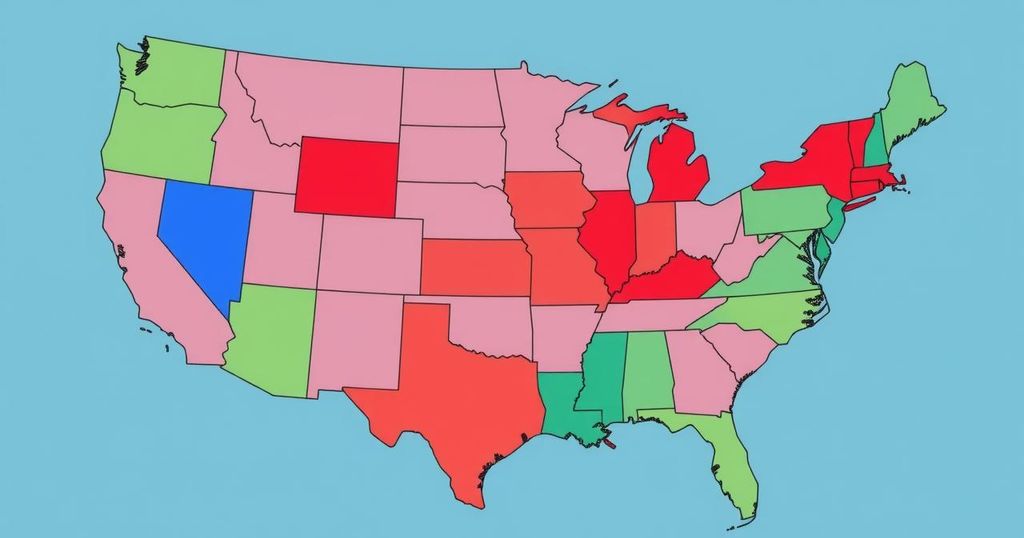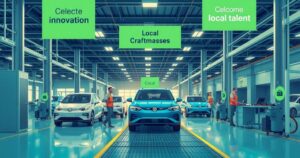U.S. States Split on Welcoming Chinese Automakers Amid National Security Concerns

U.S. states display a division regarding Chinese automaker investments, balancing potential jobs against national security concerns. Some analysts predict a future establishment of manufacturing facilities by these companies, amid rising tariffs and stricter regulations. States like Texas and South Carolina are opposed to new projects from Chinese firms, while others like New Mexico are open to them. Historical lessons indicate foreign presence could reshape the automotive industry, creating both opportunities and challenges.
U.S. states exhibit a marked divide in their willingness to engage with Chinese automakers, balancing the potential of a billion-dollar investment and thousands of jobs against national security concerns. Analysts predict that a China-based manufacturer may establish a production presence in the United States, particularly as protective tariffs increase against their imports. Historical precedents show that similar tariffs have previously driven foreign companies to build local facilities, affecting domestic car manufacturers like GM and Ford.
Colin Langan from Wells Fargo Securities suggests that the concerning job impact during economic transitions could push state officials to reconsider their stance on Chinese investments. He stated, “If you’re a governor of a state, as much as you might be anti-China, are you going to allow 5,000 people to be unemployed because you refuse to let the Chinese in?” The Trump administration has shown interest in Chinese manufacturers and may facilitate plant construction or partnerships within existing operations.
Langan indicates that collaborations like Chery’s production in former Nissan facilities in Spain and BYD’s use of a former Ford plant in Brazil might be a likely path for Chinese manufacturers in the U.S. As tariffs increase, new vehicles may be built from scratch to comply with U.S. regulations according to Sam Fiorani of AutoForecast Solutions. The Biden administration plans strict rules on Chinese technology in vehicles, complicating the entry of these automakers.
While President Trump previously welcomed Chinese manufacturers to the U.S. provided they hire American workers, he has also mentioned expanding prohibitions against imports from China. Tu Le of Sino Auto Insights echoed this sentiment, anticipating that a Chinese EV company will establish a U.S. presence within four years. Constructing a recognizable brand in the U.S. poses challenges, as exemplified by Volvo’s Polestar’s struggle for public awareness.
Despite barriers, some U.S. states express resistance to Chinese projects, fearing economic and security implications. States like Texas categorize entities affiliated with the Chinese government as security threats, impacting their investment decisions. Conversely, New Mexico openly welcomes foreign investment from automakers, provided they comply with security protocols.
Michigan’s Economic Development Corporation remains cautious about Chinese investments, reflecting on previous job losses due to foreign competition. They have attracted Gotion Inc. for a battery plant, which ignited controversy and opposition from some political figures.
States such as South Carolina refrain from facilitating projects from countries categorized as foreign adversaries, while Georgia’s laws prohibit foreign investments near military sites. Other states like Tennessee, Alabama, and Nevada also confirm reluctance to engage with Chinese automakers.
Though a new assembly plant presence is uncertain, experts suggest alternatives like using closed plants or forming partnerships with existing manufacturers to bolster market entry. Existing facilities, such as the vacant Lordstown plant in Ohio, are potential targets for revitalization. Current vehicle sales linger below pre-pandemic levels, lending concern to the utilization rates of many automotive plants in the U.S.
In conclusion, the U.S. states remain extensively divided over Chinese automaker investments rooted in economic opportunities juxtaposed against national security risks. The complexities introduced by tariffs and the geopolitical climate will significantly shape future automotive manufacturing landscapes in the U.S.
The willingness of U.S. states to embrace Chinese automaker investments is highly variable, influenced by potential job creation and national security implications. While some states are actively seeking to attract foreign investment through incentives, others remain staunchly opposed due to perceived threats from the Chinese government. The historical backdrop of foreign automaker success in the U.S. complicates the current landscape, as does fluctuating public opinion and regulatory changes. Overall, each state adopts a unique approach, leading to a fragmented national response to Chinese automakers.
Original Source: www.detroitnews.com






